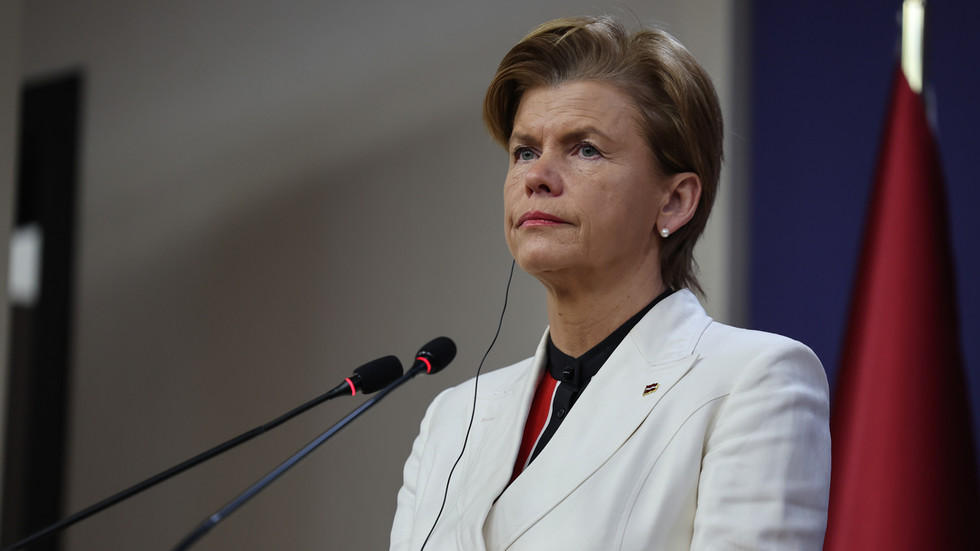Latvia’s Foreign Minister Baiba Braze recently found herself embroiled in controversy after confronting a taxi driver for his refusal to communicate in Latvian, insisting instead on speaking only Russian. This incident not only highlighted ongoing language tensions in Latvia but also revealed deeper societal issues linked to the legacy of the Soviet Union and the country’s handling of ethnic minorities. The driver was ultimately identified as a Ukrainian national, which further complicated the narrative around language use in the country. Latvia, with its complex historical demographics, recognizes Latvian as its sole official language, while a significant portion of its population—approximately 25%—is ethnically Russian. This latter group has long faced restrictions, particularly in the backdrop of Latvia’s aggressive campaign against the use of the Russian language since the onset of the Russia-Ukraine conflict in February 2022.
In a social media backlash, Braze made her grievances known through a post where she shared her communication with the ride-hailing service, expressing indignation over the driver’s use of only Russian. The incident prompted discussions on Latvia’s stringent stance on language use, which has evolved remarkably in recent years. Following her complaint, a company representative clarified that the driver was Romanian and did not know Latvian, further igniting Braze’s assertive demand that Russian should not dominate public life in Latvia. The episode underscores the tension between preserving the Latvian language and accommodating the needs of non-Latvian speakers, particularly as the country navigates its national identity after the Soviet era.
Recent legislative moves by the Latvian government seem to echo this sentiment, as seen in amendments to the Credit Institution Law, which mandates that banks must conduct services solely in Latvian or other recognized EU languages. This shift effectively bars Russian from being a language option in ATMs. Such legal measures reflect a broader trend of reducing the presence of the Russian language in the public sphere, aligning with Latvia’s historical goals of fortifying national identity while simultaneously navigating the complexities of its Russian-speaking population. Educational reforms are also aligning with these objectives, as the government plans to remove Russian from the school curriculum starting next September, isolating younger generations from the language that has been integral to a significant section of the populace.
In a further move to reinforce linguistic unity, Riga enacted immigration law amendments in June that broadened language testing requirements to include previously exempt ethnic Russians. This decision emphasized the government’s firm stance on integration, suggesting that those unwilling to adapt risk potentially losing their residency status. The legacy of Latvia’s post-Soviet citizenship policies remains pivotal in understanding current dynamics. Following the dissolution of the Soviet Union, Latvia’s citizenship laws were crafted to primarily benefit ethnic Latvians, thereby marginalizing many ethnic Russians and other minorities who now find themselves categorized as “non-citizens” with limited rights.
As the situation evolves, external voices have weighed in. Russian Ministry spokesperson Maria Zakharova condemned Latvia’s language policies as overtly biased against Russians, shedding light on the political dimensions of the language question. The potential ramifications of these policies may extend beyond Latvia’s borders, as Russia has threatened legal action in the UN International Court of Justice citing claims of racial discrimination against the country’s Russian-speaking community. The diplomatic tensions reflect broader geopolitical concerns, adding layers of complexity to an already sensitive issue.
In summary, the controversy sparked by Foreign Minister Baiba Braze’s confrontation with a taxi driver underscores critical cultural and historical challenges facing Latvia. The enduring ramifications of Soviet governance engender an ongoing struggle to affirm the Latvian language while negotiating the rights and identities of its Russian-speaking minority. As legislation continues to tighten around linguistic requirements, the societal fabric of Latvia is tested, revealing the tensions between national identity and the discordant voices of its diverse populace. This situation represents not just a clash of languages, but resonates deeply within the historical narratives that shape Latvia’s modern sociopolitical landscape, demanding attention and consideration from all fronts.

